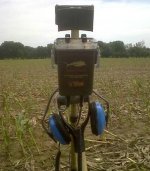Hey guys. Newb question. It doesn't necessarily apply to Tesoros, but PI detectors in general...
I've seen some posts about recommended settings on a Sand Shark, however I wanted to know if there was a different dry sand setting from a wet sand setting.
For instance if you are working wet sand right at low tide and decide to run up to the dry sand to check something, do you need to change your settings on the fly? Or will your current setting do the trick, but just not as good because of the better conductivity of the wet material.
Thanks all.
I've seen some posts about recommended settings on a Sand Shark, however I wanted to know if there was a different dry sand setting from a wet sand setting.
For instance if you are working wet sand right at low tide and decide to run up to the dry sand to check something, do you need to change your settings on the fly? Or will your current setting do the trick, but just not as good because of the better conductivity of the wet material.
Thanks all.








